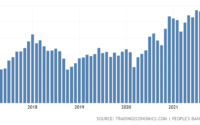New Gallup Poll Shows Half of Americans Believe News Organizations Deceive the Public
We just concluded a national, state and county election season where crime and economic volatility were at the forefront. These issues are likely to occupy the minds of voters in municipal elections across the country this year.
Staying strapped
Though economic stability is more important to public safety than it’s often given credit for, it’s not quite the deterrent as a perp knowing that the good guys can protect themselves. A recent altercation here in San Antonio is a good example.
While working in a smoke shop in my area of town, a clerk was confronted by a would-be thief who entered the store and hopped the counter. No doubt a startling turn of events, the clerk was ready.
The failed robber was later found wearing bullets from the clerk’s gunshot as change for the business he actually got at the store.
We Americans are blessed to have the human right to defend ourselves enshrined in the constitution. Guns are however, admittedly intimidating. There’s no playing around with them. As such, many people choose not to carry, or even own them, and that’s OK. That’s their prerogative.
But none of us should allow hypocritical politicians to pack heat, or have taxpayer-funded bodyguards, while they turn around and restrict how we protect ourselves. And it’s not only that we’re protecting, but also our freedom.
That’s a notion that has proven far more fragile in public officials’ hands in the last few years than previously imaginable.
Freedom
When we’re born, there’s a world of opportunity before us. Unfortunately, that starts to erode once we’re ready for kindergarten.
The vast majority of us are limited to one degree or another, to attending the closest K-12 schools that take our property taxes for funding. While wealthier families are able to eat that bill and send their kids to private schools, or homeschool them, too many of us are stuck in low-performing schools.
In adolescence, kids are then hindered from entering the workforce by measures like the minimum wage. An employer cannot afford their lack of marketable skills at the government-mandated rate. Therefore, the opportunity for young, prospective employees is delayed.
And that’s just one government impediment: employment taxes, mandated leave, favoritism shown to bigger competitors, etc. This reached a natural conclusion, in brutal fashion, with the lockdowns of recent years.
When we face this constant barrage of regulations and taxation, the cost of choosing a life of crime goes down. People may not think about it in those terms. However, when this way of life is ingrained almost from day one, how can they be expected to?
Many criminals are simply bad apples, but government creates its fair share, too.
Policy
More immediately problematic is making the cost of actually committing a crime lower. That is the effect some portions of “cite & release” programs have.
Imagine two children playing with their toys. one walks over to the other and snatches a doll out of her hand. The parent responds in one of two ways: the aggressor gets a “verbal warning,” or is put in a corner after being scolded.
Which reaction is more likely to result in a repeat offense, and which one is more likely to end up with better behavior?
Stealing a few hundred dollars’ worth of merchandise, or running off without paying computer repair, shouldn’t result in the same penalties as assault, murder, etc. But when the perpetrator spends no time behind bars or is not compelled to make his victim whole again, we’re likely to see more aggressions.
Even if such policies persist, we should give more thought to simply increasing law enforcement.
A lean police force
A key to any peaceful, prosperous society is an enforceable rule of law, and the protection of property rights. A disciplined police force has a part to play.
A police presence gives many citizens, regardless of demographic, peace of mind. It allows them to go about their business, engage with others socially and/or commercially. When and if things go sideways however, we’re our own first line of defense (see above).
Ideally, the police are there to deescalate and investigate. It’s important here to remember that they are under no constitutional duty to protect us. The events in Uvalde were a stark reminder of this.
That’s just one reason we should be cautious when calling for more police officers, especially when some police chiefs say they’re well-staffed already.
Moreover, to the extent that opposition to (recent) council policies exists, do we want greater enforcement of them? As pro-government forces fatten the budget, milk the taxpayer and expand the city’s reach, do we want to contribute to and enable that?
Like the citizenry they serve, most police officers are solid folks. What happens though, when they’re replaced by more “mental health” officers? We’d end up living out the movie “Demolition Man,” with future governments putting the muscle behind tax collection to they make sure to get theirs.
In a way, this implicitly signals surrender on trying to correct criminal behavior at its source.
—
We do our best by our kids. We rightfully see them as an opportunity to make society better. We correct bad behaviors. We educate them. We make sure they’re respectful.
It’s inevitable however, that some tragically fall through the cracks, and are then more likely to veer off onto the wrong side of the tracks. This is where we have an opportunity to step up.
Mentoring or fostering kids can make a difference. Some heroes go so far as to navigate the adoption process thicket to give kids in troubled circumstances a new life. It doesn’t even have to go that far.
Some families with a gaggle of their own to look after have an open-door policy where their kids’ friends can come and go almost at will. If these friends have issues they’re trying to escape from, a welcoming, harmonious household can show them the possibilities and offer hope.
We need to start digging deeper to radiate that harmony more broadly, rather than deal with the predictable outcome of giving policymakers more power.
[ad_2]
Source link


